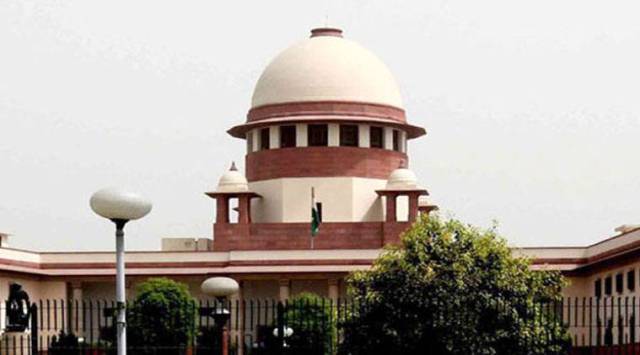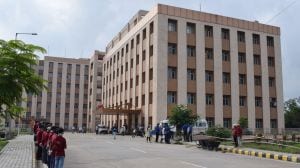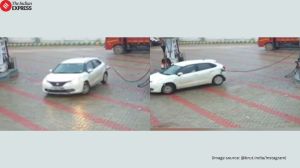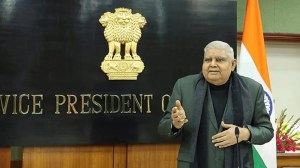Supreme Court agrees to take up Chhawla rape-murder case review plea, to set up 3-judge bench
The Supreme Court in November 2022 acquitted the three men stating that the case rested on circumstantial evidence but the prosecution failed to prove it.
 CJI Chandrachud said that he will constitute a bench comprising of himself, Justices S Ravindra Bhat and Bela M Trivedi to hear the review plea. (File)
CJI Chandrachud said that he will constitute a bench comprising of himself, Justices S Ravindra Bhat and Bela M Trivedi to hear the review plea. (File) Chief Justice of India D Y Chandrachud Wednesday agreed to set up a three-judge bench to hear the Delhi Police’s petition seeking a review of the Supreme Court judgement acquitting three death row convicts in the 2012 Chhawla gangrape-murder case.
The bench will compriseCJI Chandrachud and Justices Ravindra Bhatt and Bela M Trivedi. The Supreme Court in November 2022 acquitted the three men – Rahul, Ravi Kumar and Vinod alias Chhotu – stating that the case rested on circumstantial evidence but the prosecution failed to prove it.
Appearing for Delhi Police, Solicitor General Tushar Mehta said the trial court had granted them death sentence and that after the review petition against the Supreme Court judgement was filed, one of the men was arrested for another murder. “After we filed a review petition, one of the accused on January 26, slit the throat of somebody else,” Mehta said, adding he was bringing that to the court’s notice only to show that they are hardened criminals.
He also said that since it was a death sentence, the review would have to be heard by a three-judge bench. The SG pointed out that the earlier bench, which acquitted the trio, comprised the then Chief Justice of India U U Lalit and Justices S Ravindra Bhat and Bela M Trivedi.
Following the submission, CJI Chandrachud agreed to constitute the three-member bench consisting of himself, and Justices Bhat and Trivedi, who were part of the earlier bench, too.
As per the prosecution case, the trio kidnapped the girl in a red-coloured Tata Indica Car near Hanuman Chowk, Qutub Vihar, Chhawla, on February 9, 2012, and then raped and killed her. Her body was found three days later, on February 13.
In its order acquitting the three, the apex court had highlighted some flaws in the investigation and trial. It had said, “from the…evidence of the concerned witnesses, it clearly transpires that neither any TI (test identification) parade was conducted by the investigating officer during the course of investigation for the identification of the accused, nor any of the witnesses had identified the accused during their respective depositions before the court. Therefore, the very identity of the appellants-accused having not been duly established, the entire case of the prosecution falls flat on the very first circumstance having not been duly proved by any evidence, much less clinching evidence, against the appellants-accused”.
The bench had said that “as demonstrated…the evidence with regard to the arrest of the appellants-accused, their identification, discoveries and recoveries of the incriminating articles, the identity of the Indica car, the seizures and sealing of the articles and collection of samples, the medical and scientific evidence, the report of DNA profiling, the evidence with regard to the CDRs (call data records) etc. were not proved by the prosecution by leading, cogent, clinching and clear evidence much less unerringly pointing the guilt of the accused”.
The bench had said, “the prosecution has to bring home the charges levelled against them beyond reasonable doubt, which the prosecution has failed to do in the instant case; resultantly, the court is left with no alternative but to acquit the accused, though involved in a very heinous crime”.
Writing for the bench, Justice Trivedi said, “it may be true that if the accused involved in the heinous crime go unpunished or are acquitted, a kind of agony and frustration may be caused to the society in general and to the family of the victim in particular, however, the law does not permit the courts to punish the accused on the basis of moral conviction or on suspicion alone. No conviction should be based merely on the apprehension of indictment or condemnation over the decision rendered. Every case has to be decided by the courts strictly on merits and in accordance with law without being influenced by any kind of outside moral pressures or otherwise.”
The bench had said it was “constrained to make these observations as the court has noticed many glaring lapses having occurred during the course of the trial”.
The ruling had said, “It has been noticed from the record that out of the 49 witnesses examined by the prosecution, ten material witnesses were not cross-examined and many other important witnesses were not adequately cross-examined by the defence counsel.”
Though Section 165 of the Indian Evidence Act confers unbridled powers upon the trial courts to put any question at any stage to the witnesses to elicit the truth, but “the trial court also…acted as a passive umpire”, the court had noted.
“In the instant case, material witnesses examined by the prosecution having not been either cross-examined or adequately examined and the trial court also having acted as a passive umpire, we find that the appellants-accused were deprived of their rights to have a fair trial, apart from the fact that the truth also could not be elicited by the trial court,” the judgement had said.












